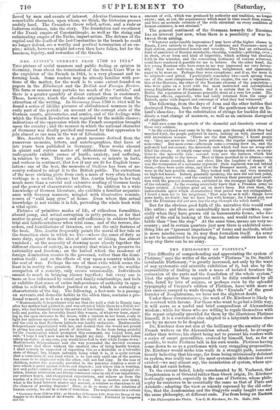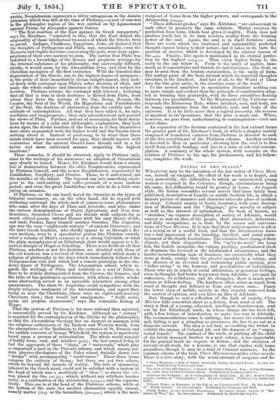THE PHILOSOPHY OF PLOTINUS. *
"THE difficulty of comprehending and appreciating the system of Plotinus," says the writer of the article "Plotinus" in Dr. Smith's invaluable Dictionary, "is greatly increased, not only by the want of any systematic and scientific exhibition of it, but also by the impossibility of finding in such a mass of isolated treatises the connexion of the parts and the foundation of the whole system." That the opinion thus expressed will be fully confirmed by all who, lured by love of science, or perhaps even by the splendid typography of Creuzer's edition of Plotinus have with more or less success essayed to wade through the "Enniads" of the great founder of Neoplatonism, we have not the slightest doubt. Under these circumstances, the work of Dr. Kirchner is likely to be received with favour. For those who want to go but a little way, it will serve as a useful and brief compendium of Alexandrian wisdom; while for those who are willing to regale themselves with the repast originally provided for them by the illustrious Plotinus himself, it is a convenient clue adapted to a labyrinth where clues are by no means to be despised. Dr. Kirchner does not aim at the brilliancy or the amenity of the French writers on the Alexandrian school. Indeed, he arranges rather than writes; his object being not to present his readers with a series of smart generalities evolved by himself, but, as far as possible, to make Plotinus talk in his own words. Plotinus having come down to us as a gentleman with very straggling propensities, Dr. Kirchner would make him walk in a straight patb conscien- tiously believing that his sage far from being intrinsically deficient in system, was really one of die most systematic thinkers that ever existed—we may almost say, the incarnation of system, where sys- tem did not exist before.'
To the current belief, lately corroborated by M. Vacherot, that Neoplatonism is of Oriental rather than Greek origin, Dr. Kirchner is strongly opposed, especially in the case of Plotinus, whose philo- sophy he conceives to be essentially the same as that of Plato and Aristotle ; adopting the view so warmly espoused by the old eclec- tics, that the Academician and the Stagyrite really taught one and the same philosophy, at different ends. Far from being an Eastern
• Die Philosophic des Plotin. Von C. H. Kirchner, Dr. Ph. Halle, 1854.
exotic, Neoplatonism represents a bitter antagonism to the Asiatic intrusion which was felt at the time of Plotinus,—a sort of renewal in the philosophic region of the war carried on by Agamemnon against Priam, by Alexander against Darius.
"The first reaction of the East against its Greek conquerors," says Dr. Kirchner, "consisted in this, that the East denied the originality of those intellectual treasures of which the Greeks were so proud. Indians, Chaldeans, Egyptians, Jews, all declared that the thoughts of Pythagoras and Plato, nay, occasionally, even the Homeric and Orphic doctrines concerning the gods, were mere appro- priations of their own ancient wisdom. The notion that Plato was indebted to a knowledge of the Mosaic and prophetic writings for the internal substance of his philosophy, was universally diffused, chiefly, it would seem, by the Alexandrian Jews, and then by the Christian apologists of the first centuries. With the Gnostics this depreciation of the Greeks ran to the highest degree of arrogance ; in the pride of their immediately divine enlightenment, they look- ed down with contempt upon Plato's sober doctrine of ideas, and made the whole culture and literature of the Greeks a subject for derision. Plotinus returns the contempt with interest ; declaring that all that is true in their doctrines is filched from Plato, from whom they have the notions of the One, Being, Reason, the Creator, the Soul of the World, the Migrations and Punishments of the goul, the doctrine of abstraction from the earthly into the solitude of contemplation. All that they have added is, he says, worthless and inappropriate ; they only misunderstand and pervert the views of Plato. Further, instead of accounting for their devia- tions by means of a calm and philosophic explanation, they look down upon the divine teachers of the Greeks as if they themselves were alone acquainted with the higher world and the Greeks knew nothing about it. Instead of professing to be wiser than those minds which have been revered for ages, they should receive with
veneration what the ancient Greek's have already said in a far better and more cultivated manner respecting the highest functions."
These remarks, it should be observed, apply to Plotinus only, since in the writings of his successors an adoption of Orientalism may clearly be traced. Hence, Dr. Kirchner would draw a strong line of demarcation between the older Neoplatonists, represented by Plotinus himself, and the newer Neoplatonists, represented by Iamhlichus, Porphyry, and Proclus. These, be it understood, are the notables of the school. The fag-end ran into something analo- gous to the card-cutting and coffee-grounds of a more modern period; . and even the great Iamblichus was able to do a little con- juring on occasion.
If Plotinus, on the one hand, hated the Gnostics as the types of Oriental contumacy, so, on the other hand, did he regard with withering contempt the whole mob of common-sense philosophers who came after the days of Plato and Aristotle, and who, under the various denominations of Stoics, Epicureans, and New Aca- demicians, furnished Cicero and his friends with subjects for so much ethical gossip, imbued Horace with his easy theory of life, and made Persins fancy himself 'another Socrates. The Augustan age was the very "eighteenth century" of ancient literature ; and the later Greek teachers, who chiefly appear to us through a Ro- man medium, were to a speculative genius like Plotinus exactly what a volume of Blair's sermons is to a strong Calvinist, or what the plain metaphysics of an Edinburgh chair would appear to a fa- natical disciple of Hegel or Schelling. There is no doubt at all that Plotinus, whether or not his doctrines are identical with those of the old teachers, was a revival of that earnest spirit which made a religion of philosophy in the days which immediately followed the Peloponnesian war, and which had a remote prototype in the sha- dowy figure of Pythagoras. The Alexandrian school, which re- gards the writings of Plato and Aristotle as a sort of Bible, is thus to be widely distinguished from the Ciceros, the Senecas, and the tribe of fine-gentlemen speculators with whom a little whole- some abstraction served as an agreeable relaxation among other amusements. The stern St. Augustine could sympathize with the deeply religious sentiment of the Alexandrians, and regret that, being so near the Christians, (there were no eighteenth-century Christians then,) they would not amalgamate. " Nulli nobis, quam isti propins accesserunt," says the venerable Bishop of Hippo.
That the system of Plotinus is far more rational than mystical, is successfully proved by Dr. Kirchner. Although an " ecstasy " is required for the contemplation of the Divine by the philosopher, so that the Alexandrian theology has an element in common with the religious enthusiasts of the Eastern and Western world, from the absorptions of the Brahmins to the ecstasies of St. Francis and the sudden converts of George Whitefield, the system is manifestly based upon a process of ratiocination. The whole world consists of bodily form, soul, and intellect (soliv) ; the last named being in fact the aggregate of those "ideas," or "universals," which play so important a part in the Platonic scheme, and which among mo-
dern physico-theologians of the Paley school dwindle down into " design' with accompanying " contrivance." These three items compose the entirety of Being; but there are yet two others, which lie beyond the bounds of reality. The love of symmetry, inherent in the Greek mind, could not be satisfied with a system at
the head of which was a multitude of "ideas "; so above the oo5s was placed the One (is3 Zs); which, without any attribute besides unity, is a sublimation of the Aristotelian iapysia and the supreme Deity. This one is at the head of the Plotiman scheme, while at the bottom of the scale lies another abstraction equally unreal, namely matter ox,0 or the boundless, (ihrscpoy,) which is the mere recipient of forms from the higher powers, and corresponds to the Aristotelian ocee,ili, "These different grades," says Dr. Kirchner, "arc subservient to each other in precisely the same relation. Matter receives its perfection from form, which first gives it reality. Form does not produce itself, but in its turn receives reality from the forming power of the soul. Again, the soul is in itself formless : since there are souls which are irrational and unbeautiful, perfected thought cannot belong to their nature, but it takes in its turn the position of matter, which is developed by the eternal reason of the sac. Finally, this again is maintained in its eternal perfec- tion by the highest ioirysca. Thus every higher Being is the unity to the one below it. Form is the unity of matter, inas- much as it concentrates and bounds its indefiniteness. The Soul, as may be seen from the human organization, is the unity of form. The central point of the Soul, around which its manifold thoughts circulate, is the Intellect. And last of all, to the World of Ideas does the One give unity, in the absolute sense of the word."
To the merest smatterer in speculative literature nothing can be more simple and evident than the principle of construction adop- ted in forming this pentarchy, with its three actualities floating between two possibilities. To the Macrocosm of the Universe cor- responds the Microcosm Man ; whose intellect, soul, and body, are so many emanations from the intellect, soul, and body of the universe. It is by little more than a logical necessity, the reverse of mystical in its operations, that the plan is made out. When, however, we pass from understanding to contemplation—c'est une autre chose.
An expansion of the doctrine contained in the last extract forms the greater part of Dr. Kirchner's book, in which a chapter mainly composed of translated extracts from.Plotinus is devoted to each of the five constituents of the Plotinian scheme. Another section is devoted to Man in particular ; showing how the soul is to free itself from earthly bondage and rise to a state of celestial contem- plation. A summary of the whole system, with remarks on the relation of Plotinus to his age, his predecessors, and his follow- ers, completes the work.



































 Previous page
Previous page